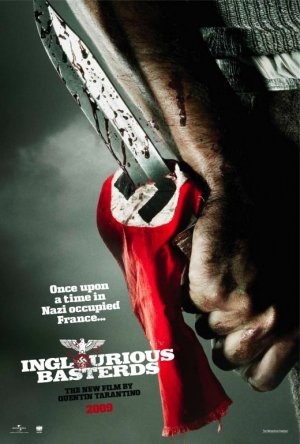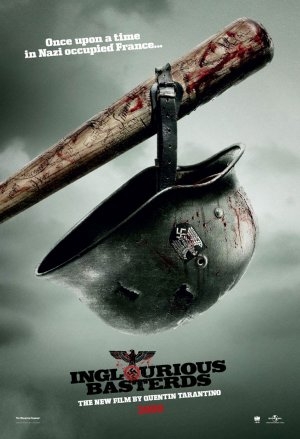 INGLOURIOUS BASTERDS (2009, directed by Quentin Tarantino, 153 minutes, U.S.)
INGLOURIOUS BASTERDS (2009, directed by Quentin Tarantino, 153 minutes, U.S.)
BY DAN BUSKIRK FILM CRITIC
Inglourious Basterds is everything we’ve come to expect from a Quentin Tarantino film: Violent, talky and cartoonish. But shorn of English dialogue, taken out of its contemporary time frame, and re-routed across the Atlantic, away from American pop culture, Tarantino has found a way to recast his various obsessions to create his most assured work in a decade. It’s a welcome reminder that despite his often self-conscious smart-alecky aesthetic hijinks, at his best few directors can compete with Tarantino’s pure cinematic mastery.
The advance word seemed less than promising. At least a decade in the making, Quentin’s WW2 remake of a minor Italian action film sounded like one of those long-gestating dream projects that lead directors to lose all perspective. Over time, it morphed into less of a remake and into an openly sadistic high-concept fantasy that would traffic in worst sort of revisionist history. In a decade in which two U.S. Presidents have worked to normalize state-sanctioned torture, Tarantino had invented a Jewish secret squadron that surrendered the moral high-ground in order to exact torture and mutilation on German soldiers. The glorified sadism of vengeful Jewish soldiers has now made it uncomfortably to the big screen (it is hard to think of any other example of a classic war film that have championed such inhumane behavior) but it is just one ghoulish element of a elaborately spun tall tale.
A equal amount of screentime is given to the journey of Shosanna Dreyfus (Melanie Laurent, new to American audiences), a Jewish woman in her twenties who is the only member of her family to escape the genocidal clutches of the Nazi “Jew Hunter” Colonel Hans Landa (Christoph Waltz in a gleeful, career-making performance).] Shosanna emerges in Paris under an assumed name to run an elegant neighborhood movie theater. While under German occupation, her theater is chosen to host the premiere screening of Joseph Goebbels’ latest propaganda masterpiece, a war film called Nation’s Pride. Learning that Hitler and all the highest-ranking members of the Nazi party plan to attend, Shosanna plots her revenge, not knowing that Nazi scalping half-Apache Aldo Raine (Brad Pitt) and his band of Star of David-wearing Nazi killers are staging an assassination plot of their own.
Although Pitt uses his estimable movie star charm to bring a swaggering charm to his Good Ol’ Boy Lieutenant Raine, it is the Austrian actor Waltz who walks (or true to his name, waltzes) away with every scene he is in. As the eloquently verbose Colonel Landa, Waltz’s gracious manner and smooth delivery transform Tarantino’s gift for dialogue into an actor’s symphony. At the movie opening, he sits at the table of a peasant farmer who is hiding Jews, portraying an admirable gentleman’s ease before explaining how rats and Jews produce the same visceral disgust in men. From there on out we know the blackness in Colonel Landa’s soul, but we can’t stop enjoying his presence because he is plainly the most intelligent character in this overstuffed deck.
it is the Austrian actor Waltz who walks (or true to his name, waltzes) away with every scene he is in. As the eloquently verbose Colonel Landa, Waltz’s gracious manner and smooth delivery transform Tarantino’s gift for dialogue into an actor’s symphony. At the movie opening, he sits at the table of a peasant farmer who is hiding Jews, portraying an admirable gentleman’s ease before explaining how rats and Jews produce the same visceral disgust in men. From there on out we know the blackness in Colonel Landa’s soul, but we can’t stop enjoying his presence because he is plainly the most intelligent character in this overstuffed deck.
Tarantino’s propensity to wander from one tangential riff to another has been reined in by the plot’s inevitable march to the big premiere showdown. Except for the rambling (though not uninteresting) card game with undercover spies, there is very little contained herein that doesn’t serve as a necessary cog in the film’s elaborate mousetrap of a plot. Even though the pieces can sometimes fit together awkwardly (indelicately separated by Chapter cards), separately they’re finely crafted moments of wonder. And none more so than the finely tuned than the concluding set piece which film lovers should especially enjoy, involving a beautifully-restored movie palace, combustible nitrate reels and the screening of a meticulously shot black and white action film where a lone Nazi soldier mows down numerous American G.I.s.
Tarantino shows the Nazi brass roaring in grotesque glee at the Americans’ onscreen slaughter but what does he really want us to see? Their inhumanity? Does he want us to question the slow-drawling Pitt as he playfully toys with his German prisoners before carving swastikas in their foreheads? It’s as if Tarantino isn’t comfortable with the violence his audience savors but he can’t resist ladling it into every film he makes. Ultimately it doesn’t matter; in the same way that Clint Eastwood’s lanky pompadoured Dirty Harry can make you cheer a vigilante cop running amok, Inglourious Basterds will give you guilty chills hoping this packed red velvet theater will go kaboom and explode into flames.
